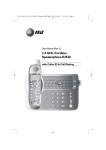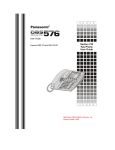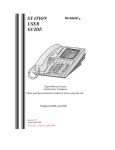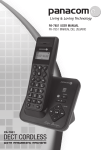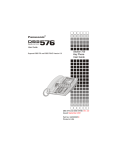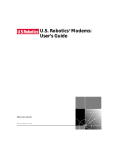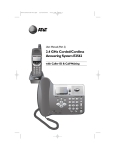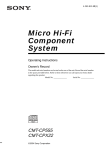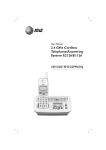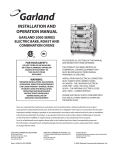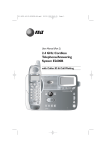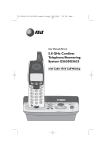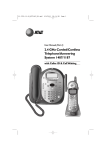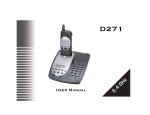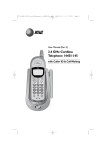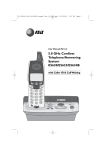Download AT&T E2555 User manual
Transcript
User Manual (Part 2)
2.4 GHz Cordless
Speakerphone/
Answering System E2555
with Caller ID & Call Waiting
You must install and
charge the battery before
using the telephone
STOP!
See page 7
for easy instructions
For customer service or product
information, visit our web site at
Please also read
www.telephones.att.com
Enclosed in product package
User Manual (Part 2)
2.4 GHz Cordless
Speakerphone/
Answering System E2555
Important Product Information
or call 1-800-222-3111
Table of contents
Add new handsets to make your phone more versatile (see page 36)
Your telephone can accommodate up to eight cordless handsets. You can add new
handsets (Model E250, sold separately) at any time. Up to four handsets at a time can
be used.
The handset provided with your telephone is automatically registered as Handset 1.
Additional handsets will be assigned numbers in the order they are registered (2, 3, 4,
etc.) up to a maximum of eight handsets.
Getting Started
Answering System Operation
Quick reference ...................................2
Parts checklist .......................................4
Before you begin ..................................5
Telephone base installation................6
Battery installation & charging ..........7
Wall mounting ......................................8
Belt clip & optional headset...............9
Answering system operation ..........24
Day and time announcements ........25
Outgoing announcements................26
Announce Only mode ......................27
Changing feature options .................28
Message playback (at base) ..............29
Message playback (at handset)........30
Recording and playing memos ........31
Message window displays.................32
Remote access....................................33
Telephone Operation
Basic handset operation ...................10
Basic base operation .........................11
Options during calls ..........................12
Intercom calls .....................................13
Handset settings.................................14
Base settings........................................15
Handset clock settings......................16
Handset 1
Handset 2
Handset 3
Appendix
Display screen status icons..............34
Alert tones & indicator lights..........35
Adding new handsets ........................36
Charging spare batteries ..................37
In case of difficulty .............................38
INDEX..................................................40
Technical specifications ....................42
Spare remote access card................43
Phonebooks
Handset and base phonebooks.......17
New phonebook entries ..................18
Phonebook search .............................19
To dial, edit or delete a listing ........20
Caller ID Logs
How Caller ID works .......................21
To review Caller ID logs..................22
To dial a Caller ID entry ..................23
Copyright © 2003 Advanced American Telephones. All Rights Reserved.
AT&T and the Globe Design are trademarks of AT&T Corporation.,
licensed to Advanced American Telephones.
1
Getting Started
Getting Started
Quick reference guide
Quick reference guide
Handset
Base/Speakerphone
Swivel antenna fully
upright for best results
Softkeys
Press a softkey to select a menu item
displayed just above the key.
Off/Clear
During a call, press to hang up.
Item 1 Item 2 Item 3
While using menus, press to cancel an
operation, back up to the previous
menu, or exit the menu display.
Phone/Flash
Press to begin a call, then dial a number.
Answering
system
controls
Telephone
function keys
Xfer/Intercom
Telephone function keys (see pages 11-15)
During a call, press to receive an incoming
call, if Call Waiting is activated (see page 12).
Press to transfer a call or initiate an
intercom conversation (see pages 10 & 13).
Speaker
Sound Select
Press to activate handset speakerphone. Press again to switch call back
to earpiece.
Press to customize speaker sound for
clear speakerphone conversations (see
page 12).
Item 1 Item 2 Item 3
SOFTKEYS ............Press to select menu item displayed just above the key
CLEAR ....................Press to cancel an operation, back up to the
previous menu, or exit the menu display
INTERCOM ............Press to transfer a call or initiate an intercom conversation
FLASH ....................During a call, press to receive an incoming call, if
Call Waiting is activated
VOLUME ................Press to adjust speakerphone listening volume
MUTE ......................Press to silence microphone; press again to resume
SPEAKERPHONE ..Press to turn speakerphone on or off (begin or end a call)
Screen menus
Redial Log
(See page 10)
Phonebook
(See page 17)
HANDSET 1
REDIAL
MENU
MEM
Main Menu
Handset Settings
Calls Log ................See page 21
Ringer Volume ........See page 14
Answering system controls (see pages 24-33)
Play Messages ......See page 30
Ringer Melody ........See page 14
Handset Settings ........See menu
Low Batt Tone ........See page 14
Press to repeat message.
Press twice to hear
previous message.
Set Time ................See page 16
Range Tone ............See page 14
Clock Mode ............See page 16
Keypad Tone ..........See page 14
Register ..................See page 36
Contrast ..................See page 14
Language................See page 14
Menus
2
Press to skip to next
message.
Press to play or stop playing messages
ON/OFF ..................Press to turn answering system on or off
DELETE ..................Press to delete message currently playing
TIME SET................Press to set date and time
MENU......................Press to review or change answering system options
CHANGE ................Press to change a menu option
RECORD ................Press to record a memo or outgoing announcement
3
Getting Started
Getting Started
Parts checklist
Before you begin
Remember to save your sales receipt and original packaging in case you ever need to
ship your telephone for warranty service. Check to make sure the telephone package
includes the following:
About Caller Identification
Telephone operating range
Caller ID with Call Waiting features in
this telephone let you see who’s calling
before you answer the phone, even
when you’re on another call. These
features require services provided by
your local telephone company.
This cordless telephone operates with
the maximum power allowed by the
Federal Communications Commission
(FCC). Even so, this handset and base
can communicate over only a certain
distance — which can vary with the
locations of the base and handset, the
weather, and the construction of your
home or office. For best performance,
keep the base antenna fully upright.
Contact your telephone service
provider if:
Wall mount bracket
Telephone base
• You have both Caller ID and Call
Waiting, but as separate services
(you may need combined service);
If you receive a call while you are
out of range, the handset might not
ring — or if it does ring, the call might
not connect when you press PHONE.
Move closer to the base, then press
PHONE to answer the call.
• You have only Caller ID service, or
only Call Waiting service;
Power
adapter
Long telephone line cord
Telephone
handset
Short telephone line cord
Batteries
• You don’t subscribe to any Caller
ID or Call Waiting services.
If you move out of range during a
phone conversation, you might hear
noise or interference. To improve
reception, move closer to the base.
You can use this phone with regular
Caller ID service, and you can use its
other features without subscribing to
either Caller ID or combined Caller ID
with Call Waiting service. There may
be fees for these services, and they
may not be available in all areas.
If you move out of range without
pressing OFF, your phone will be left
“off the hook.” To hang up properly,
walk back toward the telephone base,
periodically pressing OFF until the call
is disconnected.
Caller ID features will work only if
both you and the caller are in areas
offering Caller ID service, and if both
telephone companies use compatible
equipment.
Belt clip
See Caller ID Operation, beginning on
page 21, for more details about how
these features work.
4
5
Getting Started
Getting Started
Telephone base installation
Battery installation & charging
Install the speakerphone base as shown below. Choose a location away from electronic
equipment, such as personal computers, television sets or microwave ovens. Avoid
excessive heat, cold, dust or moisture.
After installation, place the handset in the base and allow the batteries to charge for 8
hours before use. You can keep batteries charged by returning the handset to the base
after each use. When battery power is fully depleted, a full recharge takes about 6 hours.
LOW BATTERY
REDIAL
MEM
Low battery indicator
Return handset to base to recharge
when this symbol flashes. (Handset
will beep when battery is low.)
NOTE: Use only the power
cord supplied with this product.
If you need a replacement, call
1 800 222–3111.
Be sure to use an electrical outlet
not controlled by a wall switch.
MENU
Plug power cord
transformer into
electrical outlet
Plug long telephone
line cord into
telephone jack
Press coin into slot on
base of handset to
release latch, then
remove battery cover
Insert supplied
batteries
Caution: Use only AT&T 2AA
NiCad or NiMH rechargeable
batteries. Do not use AA
alkaline batteries.
Route cords through
slot in base
Place handset in base to charge
for 8 hours before first use.
Rotate antenna to fully upright
position.
To replace battery cover
Insert top
tab first
Press down to
click in place
DID YOU KNOW?
Optional spare batteries can be kept charged in
the base, for quick replacement when handset
batteries become depleted (see page 37).
6
7
Getting Started
Getting Started
Wall mounting
Belt clip & optional headset
The speakerphone base can be installed on any standard wall-phone outlet as shown
below. Choose a location away from electronic equipment, such as personal computers, television sets or microwave ovens. Avoid excessive heat, cold, dust or moisture.
Install belt clip as shown below if desired.
Connect cords as shown, then press
and slide down firmly so base is held
securely on outlet mounting pegs
Clip wall-mount bracket
securely into notches on
underside of base
For hands-free telephone conversations, you can use any industry standard 2.5 mm
headset (purchased separately). For best results use an AT&T 2.5 mm headset.
Snap belt clip into notches on
side of handset. Rotate and pull
to remove.
Plug short telephone
line cord into telephone
jack
Plug power cord transformer
into electrical outlet
Place handset in base to charge
for 8 hours before first use.
Plug 2.5 mm headset
into jack on side of
handset (beneath
small rubber cap)
Rotate antenna
to fully upright
position
8
9
Telephone Operation
Telephone Operation
Basic handset operation
Basic base operation
Making and answering calls
Making and answering calls
To answer a call, press PHONE or any dial pad button.
To make a call, press PHONE, then dial a number. Press
OFF to hang up.
Volume
To preview numbers before dialing, enter numbers first,
then press PHONE to dial. Press CLEAR at any time to
make corrections as you are entering numbers.
Speakerphone
MENU
MEM
Last number redial
To answer a call, press SPEAKER. To make a call, press
SPEAKER, then dial a number. During a call you can
press SPEAKER to toggle between hands-free speakerphone and normal handset use. Press OFF to hang up.
Press REDIAL to display the last 10 numbers called (up to
32 digits each). Use the ^V buttons to select a
number, then press PEAKERPHONE to dial (press
SELECT to erase this number from the redial memory,
or copy it into your phonebook).
REDIAL
MENU
MEM
XFER
HOLD
MUTE
HOLD
MUTE
1
^
OK
^
Press HOLD to place a call on hold. Press SPEAKERPHONE to resume the call.
XFER
HOLD
MUTE
Hold and mute
Press HOLD to place a call on hold. Press PHONE (or
SPEAKER) to resume the call.
Call transfer
XFER
HOLD
MUTE
Press XFER to display a list of sets. Use the ^V
buttons to highlight the set you want, then press OK to
transfer the call to the remote set.
During a conversation you can transfer the call to a
handset.
Press XFER to display a list of sets. Use the ^V
buttons to highlight the set you want, then press OK to
transfer the call to the remote set.
Call transfer
During a conversation you can transfer the call to the
base speakerphone or to another handset.
BASE
HANDSET 2
HANDSET 3
Hold and mute
Press MUTE to silence the microphone. You will be able
to hear, but your caller will not be able to hear you
until you press MUTE again to resume speaking.
Press MUTE to silence the microphone. You will be able
to hear, but your caller will not be able to hear you
until you press MUTE again to resume speaking.
1
XFER
Last number redial
Press REDIAL to display the last 10 numbers called (up to
32 digits each). Use the ^V buttons to select a
number, then press PHONE to dial. Press SELECT then
ERASE to delete this number from the redial memory,
or SAVE to copy the number into your phonebook.
1
To preview numbers before dialing, enter numbers first,
then press SPEAKERPHONE to dial. Press CLEAR at any
time to make corrections as you are entering numbers.
Hands-free speakerphone calls
HANDSET 1
REDIAL
To answer an incoming call, press SPEAKERPHONE. To
make a call, press SPEAKERPHONE, then dial a number.
Press SPEAKERPHONE again to hang up.
HANDSET 1
HANDSET 2
HANDSET 3
^
OK
The call will be placed on hold. Press PHONE or SPEAKER
at the remote set to resume the call.
V
The call will be placed on hold. Press PHONE or SPEAKER
at the remote set to resume the call.
10
11
Telephone Operation
Volume
Flash
Silence ringer
Tone
Telephone Operation
Options while on calls
Intercom calls
To adjust volume or sound quality
Intercom calls
Press VOLUME buttons on the handset or the base to
adjust listening volume. Each button press raises or
lowers volume by one level.
The intercom allows conversation between the handset
and base, or between handsets if you have registered
additional handsets for use with your system.
During a handset call you can press SOUND SELECT to
change sound quality. You can choose Natural Audio,
Bass Boost, Mid Boost or Treble Boost. Each button
press changes to the next tone type.
Press the INTERCOM button at a handset or at the base.
Scroll down to select a station, or select GLOBAL PAGE
to page all stations. Press OK to page the selected station.
At a handset, press PHONE to answer an intercom page.
At the base, the phone will ring once, then answer the
intercom page automatically.
Sound quality
Call waiting
Press INTERCOM
When your intercom call is finished, press OFF at the
handset (or INTERCOM at the base) to end the call.
If you have Call Waiting service, you will hear a beep if
someone calls while you are already on a call. Press
FLASH to put your current call on hold and take the new
call. You can press FLASH at any time to switch back
and forth between calls.
Ring silencing
Press OFF while the phone is ringing to silence the ringer.
You can still answer, or let the caller leave a message.
Handling incoming calls
The phone will beep if you receive an outside call during
an intercom conversation. You have two options:
Select station to page
BASE
HANDSET 2
HANDSET 3
GLOBAL PAGE
^
3-way conference calls
During an outside call, you can use both the handset and
base (or two local handsets) to allow a three-way
conversation.
OK
V
• Press PHONE at the handset (or SPEAKERPHONE at
the base) to answer the outside call and conference
it in with your existing intercom conversation.
• Press OFF (or INTERCOM at the base) to terminate
the intercom call, then press PHONE (or SPEAKERPHONE at the base) to answer the incoming call.
While a call is in progress, others can press PHONE or
SPEAKER to join the conference call. Others can press
OFF (or SPEAKER) to drop out of the conference call,
but the call will not be terminated until all sets hang up.
Temporary tone dialing
If you have dial pulse (rotary) service, you can switch to
touch tone dialing during a call by pressing *. This
can be useful if you need to send tone signals for access
to answering systems or long-distance services.
12
13
Telephone Operation
Telephone Operation
Handset settings
Base settings
Ringer volume
Ringer volume
At this menu you can set a default ring volume level (14), or turn the ringer off. Press the <> buttons to
hear an example of each level. Press OK to save your
selection.
At this menu you can set a default ring volume level (16), or turn the ringer off. Press the <> buttons to
hear an example of each level. Press OK to save your
selection.
Ringer melody
Select MENU
This feature allows you to choose one of eight incoming
call melodies. Press the <> buttons to hear an
example of each. Press OK to save your selection.
HANDSET 1
REDIAL
MENU
MEM
Select HANDSET SETTINGS
CALLS LOG
PLAY MESSAGES
HANDSET SETTINGS
SET TIME
^
OK
^
Scroll to choose desired item
RINGER VOLUME
RINGER MELODY
LOW BATT TONE
RANGE TONE
^
OK
Low battery tone
The handset is factory programmed to alert you with a
tone when the battery is low and needs recharging. Use
the ON/OFF menu buttons to turn this feature on or off.
Press OK to save your selection.
Out-of-range tone
The handset is factory programmed to alert you with a
tone when the handset is too far from the base. Use
the ON/OFF menu buttons to turn this feature on or off.
Press OK to save your selection.
Keypad tone
^
The handset is factory programmed to beep at each
keypress. Use the ON/OFF menu buttons to turn this
feature on or off. Press OK to save your selection.
Ringer melody
Select MENU
REDIAL
MENU
This feature allows you to choose one of eight incoming
call melodies. Press the <> buttons to hear an
example of each. Press OK to save your selection.
MEM
Keypad tone
Select BASE SETTINGS
CALLS LOG
BASE SETTINGS
DISPLAY BASE ID
^
OK
Tone/pulse
^
Scroll to choose desired item
RINGER VOLUME
RINGER MELODY
KEYPAD TONE
TONE/PULSE
^
OK
^
At this menu you can adjust screen contrast to one of
16 levels. Use the <> buttons to select the level you
prefer. Press OK to save your selection.
RANGE TONE
KEYPAD TONE
CONTRAST
LANGUAGE
^
OK
^
Contrast
At this menu you can adjust screen contrast to one of
16 levels. Use the <> buttons to select the level you
prefer. Press OK to save your selection.
At this menu you can select the language used in all
menus and screen displays. Use the ^V buttons to
select English, Spanish or French. Press OK to save your
selection.
Press OK to select
KEYPAD TONE
TONE/PULSE
CONTRAST
LANGUAGE
^
Language
Factory default setting is TONE. Change this to PULSE
only if you do not have touch-tone dialing service. Press
OK to save your selection.
Language
Contrast
Press OK to select
The handset is factory programmed to beep at each
keypress. Use the ON/OFF menu buttons to turn this
feature on or off. Press OK to save your selection.
OK
^
At this menu you can select the language used in all
menus and screen displays. Use the ^V buttons to
select English, Spanish or French. Press OK to save your
selection.
14
15
Telephone Operation
Handset clock settings
To set time
Phonebooks
PAT JOHNSON
123-456-7890
^
EDIT
^
Follow steps at left to set the handset clock time. Use
the keypad to enter four digits (i.e., 09:15), then press
AM/PM to toggle the display between AM and PM.
When the correct time is displayed, press SAVE.
NOTE: You can choose to set the time manually, or
you can allow it to be set automatically with incoming
Caller ID information. The time will be set automatically
only if you subscribe to Caller ID service provided by
your local telephone company (see page 5).
Select MENU
HANDSET 1
REDIAL
MENU
MEM
To set the answering system clock, see page 25.
To turn clock on or off
Select SET TIME
HANDSET SETTINGS
SET TIME
CLOCK MODE
REGISTER
^
OK
^
The handset time display is optional. To turn it on or
off, select MENU, press V until CLOCK MODE is
highlighted, then press OK.
Press ON or OFF buttons to enable or disable the clock
display, then press OK.
Handset and base phonebooks
There are separate phonebook directories in the handset and the base.
Each phonebook can store up to 50 entries. Each entry
can contain a number up to 32 digits, and a name up to
15 letters long. A convenient search feature can help
you find and dial numbers quickly (see page 19).
Handset: 50 entries
Base: 50 entries
The procedure for entering, editing and dialing phonebook entries is the same for both the handset and the
base.
Timeouts and error tones
If you pause for too long while making an entry the procedure will time out and you will have to begin again.
If all memory locations are in use, an error tone will
sound when you attempt to enter a new number. This
means the memory is full, and you will not be able to
store a new number until you delete an existing one.
Enter time, press AM/PM, then SAVE
SET TIME
12:00 AM
<
SAVE
AM/PM
To turn clock on or off
CLOCK ENABLE
ON
OFF
OK
ON
16
17
Phonebooks
Phonebooks
Enter number, then press MEM
Press MEM to select phonebook
New phonebook entries
555-1234
PAUSE
MENU
MEM
To enter a number
Phonebook search
REDIAL
MENU
MEM
Use the dial pad to enter up to 32 digits. When the
number is complete, press MEM.
Enter name, then press SAVE
• Press CLEAR to erase numbers if you make a mistake.
To browse through the directory
• Press PAUSE to enter a 3-second dialing pause.
ENTER NAME
PAT WILLIAMS_
^
OK
V
To enter a name
Press dial pad buttons once for the first letter, twice for
the second, three times for the third. Continue for
lower-case letters. To enter a number, continue
pressing the button until the number appears.
To browse, press ^ or V to scroll through all
entries one by one.
^
PAUSE
MENU
MEM
SEARCH FOR
2
J_
CLEAR
FIND
Press 7 times to enter “2”
• Press 1 repeatedly to enter an ampersand (&),
apostrophe ('), comma (,), period (.), or digit (1).
Storing the entry
Press SAVE to store your new phonebook entry. To
change it later, see page 20.
18
Press dial pad buttons once for the first letter, twice for
the second, three times for the third, as shown on the
previous page.
For example, press 5 (JKL) once to find Jack, twice to
find Kevin, or three times to find Linda.
The cursor moves to the right when you press another
dial pad button or the > button. Press > twice to
enter a space.
• Press CLEAR to erase letters if you make a mistake.
To search alphabetically
To shorten your search, press FIND, then use the telephone dial pad to enter the first letter of a name. When
you press FIND, the first name beginning with that letter
will be displayed.
5
Press twice to enter “B” (5 times for “b”)
Press 3 times to enter “C” (6 times for “c”)
V
FIND
Press once to enter “A” (4 times for “a”)
ENTRY HAS BEEN
STORED!
You can use the up/down arrows to browse through
the phonebook, or search to find a specific entry. You
can press CLEAR at any time to exit the directory.
To call a displayed number
JACK
123-555-4321
^
FIND
V
When you find the entry you want, press PHONE (or
SPEAKER) to dial. Or press EDIT to modify the entry
(see next page).
Shortcut
Press * at any time while a phonebook entry is
displayed to jump immediately to the Search menu.
19
Phonebooks
PAT WILLIAMS
555-1234
^
OK
Caller ID Logs
To dial, edit or delete entries
^
To dial a number
CHRIS THOMPSON
123-555-6789
11:29 A OCT4
When any phonebook entry is displayed, press PHONE
(or SPEAKER) to dial the displayed number.
Press DEL to delete entry
DEL
CHRIS THOMPSON
123-555-6789
11:29 A OCT4 N01
• To delete only the displayed entry, press THIS.
• To delete all entries in the phonebook, press ALL .
To confirm your choice, press YES at the
confirmation screen, and all entries will be deleted.
Once deleted, entries cannot be recovered.
PAT WILLIAMS
555-1234
To edit a listing
EDIT
Press EDIT twice to modify the entry. You can change
the name or number by following the steps on page 18.
Select name or number to change
Time of call
^
CID
Entry number:
N = New call
# = Old call
V
Date of call
Handset: 50 entries
Base: 50 entries
Your call log holds up to 50 entries. You can review the
call log to find out who has called, return the call without dialing, or copy the caller’s name and number into
your phonebook.
Each log entry is numbered (number 1 is always the most
recent). When the call log is full, the oldest entry is
deleted to make room for new incoming call information.
If you answer a call before the information appears on
the screen, it will not be saved in your call log.
PAT WILLIAMS
555-1234
NAME
Caller’s number
Press EDIT, then DEL to display options:
EDIT
Press EDIT to change entry
DEL
If you subscribe to Caller ID service provided by your
local phone company, information about each caller will
be displayed after the first ring.
Caller’s name
To delete an entry
PAT WILLIAMS
555-1234
How Caller ID works
Handset and base call logs
NUMBER
There are separate Caller ID logs in the handset and the
base. Each call log can store up to 50 entries. Each entry
can contain a number up to 16 digits, and a name up to
16 letters long. The procedure for viewing, dialing,
deleting and transferring call log entries to your phonebook is the same for both the handset and the base.
About names
If the telephone number of the person calling matches a
number in your phonebook, the name that appears on
screen will match the name as you entered it into your
phonebook. (Example: If “Christine Smith” calls, her
name will appear as “Chris” if this is how you entered it
into your phonebook.)
20
21
Caller ID Logs
To review your call log
HANDSET 1
REDIAL
MENU
MEM
To review your call log
Caller ID Logs
CHRIS THOMPSON
123-555-6789
11:29 A OCT4 N01
^
CID
V
The most recent call is displayed first. Use the arrow
buttons to scroll through the list as shown at left.
CALLS LOG
To return a call
^
OK
V
Press PHONE (or SPEAKER) to call the person currently
displayed (see next page for important dialing options).
CHRIS THOMPSON
123-555-6789
11:29 A OCT4 N01
DEL
OPT#
SAVE
Other options
CHRIS THOMPSON
123-555-6789
11:29 A OCT4 N01
^
OK
V
Press CID to display other options:
DEL: Press to delete. Press THIS to delete the displayed
entry. Press ALL, then YES to delete all entries in the
call log.
OPT#:
Display
previous
entry
Display
next
entry
DIAL
When any Caller ID screen is displayed, press PHONE
(or SPEAKER) to dial the number exactly as it appears
on the screen.
Dialing options
Caller ID numbers may appear with an area code that
may not be required for local calls. If the number
displayed is not in the correct format, you can change
how it is dialed.
Select CID, then OPT # to see a list of dialing options.
Press V or ^ to highlight the option you want, then
press DIAL.
555-6789
1-555-6789
123-555-6789
1-123-555-6789
^
To dial a call log entry
V
Press to view dialing options (see next page).
SAVE: Press to copy the displayed name and number
into your phonebook (see page 18).
555-6789
1-555-6789
123-555-6789
1-123-555-6789
^
DIAL
V
CHRIS THOMPSON
123-555-6789
11:29 A OCT4 N01
DEL
OPT#
Delete entry
(or all entries)
Select desired option,
then press to dial
SAVE
Copy entry to
phonebook
22
23
Answering System Operation
14
Answering System
Operation
Day and time announcements
To set day and time
Before playing each message, the answering system
announces the day and time the message was received.
Message capacity
Message counter
Number of messages waiting
(or, during playback, message
number currently playing)
The answering system can record up to 99
messages, depending on how long each message is.
Individual messages can be up to 4 minutes long, but
total maximum recording time for all messages is 25
minutes. Messages will remain available for replay until
you delete them.
1
TIME SET
“Friday, 10:07 am, 2003”
“To change clock,
press Time Set”
2
Handset access
TIME SET
“Friday”
In addition to the features described in this section, you
can also use your handset to review or delete messages
(see page 30).
3
The system uses voice prompts to guide you. Each time
you press CHANGE, the day, hour, minute or year
advances by one. When you hear the correct setting,
press TIME SET to move to the next setting.
CHANGE
To check day and time
“Monday”
You can press TIME SET at any time to hear the
current day and time without changing it.
Press until correct day is spoken
4
Before using the answering system, you should follow
the steps at left to set the day and time, so messages
are dated correctly.
TIME SET
“10 am”
5
Press to start or stop message
playback (see page 29)
CHANGE
NOTE: Press and hold CHANGE to advance the minute or year by 10.
“2 pm”
Press until correct hour is spoken
6
Press to turn answering
system on or off
Press to delete message
(see page 29)
Press to repeat message;
hold to slow playback
(see page 29)
Press to skip message;
hold to speed up playback
(see page 29)
TIME SET
“07”
7
NOTE: After you set the time once, it will thereafter be set automatically
with incoming Caller ID information. The time will be set automatically only if
you subscribe to Caller ID service provided by your local telephone company
(see page 5).
CHANGE
“26”
Press until correct minute is spoken
8
TIME SET
“2003”
Press to set clock
(see page 25)
Press to record memo (see page 31)
or outgoing announcement (page 26)
9
@CHANGE
“2004”
Press until correct year is spoken
Press repeatedly to hear
feature options (see page 28)
Press to select or change a
feature option (see page 28)
24
10
@TIME SET
“Monday, 2:26 pm, 2004”
25
Answering System Operation
12
Answering System Operation
A
Outgoing announcements
Outgoing announcements are the messages callers hear
when calls are answered by the answering system.
Elapsed
recording time
(seconds)
1
Press to stop
recording
MENU
To record your outgoing announcement
“Change
announcement”
Press MENU until you hear “Change announcement.”
Then press RECORD and begin speaking after you hear
“Now recording.” Speak facing the telephone base from
about 9 inches away.
2
(Play/Stop)
(Plays announcement
previously recorded)
Or
2
Elapsed time (in seconds) will be shown in the message
window as you record. You can record an announcement up to 90 seconds long. Announcements less than 3
seconds long will not be recorded.
RECORD
“Now recording...”
3
The phone is pre-programmed with an announcement
that answers calls with “Hello. Please leave a message
after the tone.” You can use this announcement, or
replace it with a recording of your own voice.
Speak into microphone
To delete your outgoing announcement
Press MENU until you hear “Change announcement,”
then press PLAY/STOP to begin playback. Press DELETE
during playback to delete your announcement.
When your announcement is deleted, calls will be
answered with the pre-programmed announcement
described above.
Announce Only mode
“A” is displayed when Announce
Only is activated
In Announce Only mode, callers hear an announcement
but cannot leave messages. This option is useful, for
example, to notify callers that you will be away for an
extended period and request that they call back after a
certain date.
1
MENU
To turn Announce Only on or off
“Change
Announce Only”
“Off”
Press MENU repeatedly until you hear “Change
Announce Only.” Then press CHANGE until you hear
the option you want (On or Off). Press PLAY/STOP to
store your selection and exit, or press MENU again to
modify other features (see page 28).
CHANGE
To record your outgoing announcement
“On”
When Announce Only is turned on, calls are answered
with a pre-recorded announcement that says “We’re
sorry, messages to this number cannot be accepted.”
You can use this announcement, or replace it with a
recording of your own voice.
2
3
4
CHANGE
(Play/Stop)
Beep
(Option selected)
After turning on the Announce Only feature, follow the
steps on page 26 to record your announcement. Callers
will hear this announcement only when the Announce
Only feature is turned on. Otherwise they will hear the
standard announcement asking them to leave a message.
Microphone
4
(Play/Stop)
(Announcement is
played back)
26
27
Answering System Operation
Answering System Operation
Changing feature options
Number of messages waiting
(or, during playback, message
number currently playing)
Menu features can be changed to customize how the
answering system operates. Press MENU repeatedly to
hear each feature. Press CHANGE when you hear the
feature you want to modify.
1
CHANGE
Press until desired selection
is heard
3
MENU
Press to set selection and
move to next menu option
Or
Feature options
Press PLAY/STOP to hear messages. The system
announces the number of messages, then begins playback.
If you have new messages waiting, you will hear only the
new messages (oldest first). If there are no new messages,
the system will play back all messages (oldest first).
MENU
Press until desired feature
is heard(see list at right)
2
14
Message playback (at base)
(Default settings underlined)
System announces:
Feature description:
“Change Announcement”
Options: [record announcement]
Record your outgoing announcement
(see page 26).
“Change remote access code”
Options: [enter 2-digit code] 19
Enter a 2-digit number (10-99) for remote
access from another phone (see page 33).
“Change message alert”
Options: On / Off
When on, the telephone beeps every 10
seconds when you have new messages.
“Change announce only”
Options: On / Off
When on, callers hear an announcement
but cannot leave messages (see page 27).
“Change call screening”
Options: On / Off
When on, you can hear callers leave
messages, or answer the call.
“Change number of rings”
Options: 2 / 4 / 6 /Toll Saver
Choose number of rings before the system
answers a call. When Toll Saver is active,
the system answers after 2 rings if you
have new messages, and after 4 rings if
you have no new messages.
Press PLAY/STOP to begin or
end message playback
Announcements
1
• When playback begins, you will hear the number of
messages waiting.
(Play/Stop)
“You have [xx] new
and [xx] old messages”
Message playback begins. See
options at right.
2
• Before each message, you will hear the day and time
it was received.
• After the last message, you will hear “End of messages.”
If the system has less than 5 minutes of recording
time left, you will hear time remaining.
(Play/Stop)
Message playback ends.
Options during playback
• Press VOLUME button to adjust speaker volume.
(Play/Stop)
Press to set selection and
exit menu
• Press SKIP to skip to next message (or hold down to
speed up message playback).
• Press REPEAT to repeat message currently playing.
Press twice to hear previous message. (Hold down
to slow message playback).
NOTE: If “F” is flashing in
the message window, memory is
full. You will have to delete some
messages before new ones can
be received.
NOTE: Press and hold CHANGE to advance the remote access code
number by 10.
NOTE: New (unheard)
messages cannot be deleted.
28
• Press DELETE to delete message being played back.
• Press PLAY/STOP to stop playback.
To delete all messages
To delete all messages, press and hold DELETE while
the phone is idle (not during a call, or during message
playback).
29
Answering System Operation
Answering System Operation
12
Message playback (at handset)
Follow the steps at left to use your handset to review or
delete voice messages.
Listening options
HANDSET 1
REDIAL
MENU
MEM
When you select PLAY MESSAGES you will hear messages
through the handset speakerphone. Press SPEAKER to
transfer playback to the handset earpiece for private
review of messages.
Elapsed
recording time
(seconds)
Press to stop
recording
1
Playback options
^
OK
V
At the Messages screen, you have several options:
Memos are messages you record yourself. They are
saved, played back and deleted exactly like incoming
messages. You can record a memo as a reminder to
yourself, or leave a message for someone else if others
in your household use the answering system.
To record a memo
RECORD
“Now recording...”
CALLS LOG
PLAY MESSAGES
HANDSET SETTINGS
SET TIME
Recording and playing memos
2
Speak into microphone
Follow the steps at left to record a memo. Elapsed time
(in seconds) is shown in the message window as you
record. You can record a memo up to 4 minutes long.
Memos less than 1 second long will not be recorded.
• Press OFF to end message playback.
To play back a memo
• Press < to repeat the message currently playing
(press twice to hear previous message).
Press PLAY/STOP to hear messages and memos (see
page 29 for other options).
• Press > to skip forward to the next message.
“You have [xx] new
and [xx] old messages”
• Press volume buttons on the side of the handset to
adjust listening volume.
MESSAGE PLAYBACK
PRESS OFF TO END
<
DEL
>
Microphone
• Press DEL to delete the message currently playing.
Announcements
3
Beep
(Memo has been
recorded)
• When playback begins, you will hear the number of
messages.
Repeat Delete Skip
• Before each message, you will hear the day and time
it was received.
• After the last message, you will hear “End of messages.” If the system has less than 5 minutes of
recording time left, you will hear time remaining.
30
31
Answering System Operation
Answering System Operation
1
Message window displays
12
Message window
(Flashes when new
messages are waiting)
The message window usually displays the total number of
memos and incoming messages. See list below for
explanation of other displays in this window.
Message window displays
0
No messages waiting.
1-8
Current volume level while adusting volume
1-98
Number of messages/memos, or message
currently playing (see page 29).
10-99
Current Remote Access Code while setting
(see page 28).
1-99 (counting)
Elapsed time while recording a memo (see page 31)
or announcement up to 90 seconds (page 26).
99 (flashing)
Memo recording exceeded maximum time of 99
seconds.
F (flashing)
Memory is full. Messages must be deleted before
new messages can be received.
CL (flashing)
Clock needs to be set (see page 25).
A
Announce Only mode is on (see page 27).
--
System is answering a call, or being accessed
remotely.
-- (flashing)
System is being programmed or initialized.
On (or) OF
Displayed for 1 second when any answering
system setting is turned on or off.
Dial your telephone number from
any touch-tone phone
Remote access
2
When system answers, enter 2digit Remote Access Code (“19”
unless you have changed it)
3
Enter remote commands
(see list at right)
Play messages
Press to hear new messages (if none are
new, all play back).
Hang up to end call and save all
undeleted messages
Repeat or go back
Press to repeat current message. Press
twice (# 4 # 4) to hear previous message.
Skip to next message
Press to skip current message and
advance to next message.
Stop
Press to stop any operation
(stop playback, stop recording).
Delete message
Press during playback to delete current
message.
Review announcement
Press to review current outgoing
announcement.
Record announcement
Press * 7, wait for beep, then begin
speaking. Press # 5 to stop recording and
hear playback of new announcement.
Record memo
Press * 8, then begin speaking. Press #
5 to stop recording.
Turn system off
Press to turn off answering system.
Incoming calls will no longer be answered.
Turn system on
#0
If off, system will answer after 10 rings. Enter
your access code, then press # 0 to turn on.
Help Menu
Press to hear list of features & commands.
Exit
End remote access call (or hang up).
4
A two-digit security code is required to access your
answering system from any touch-tone phone. This
code is “19” by default; see page 28 to change it.
#2
#4
#6
#5
#9
#7
*7to begin recording
#5to stop recording
NOTE: If you pause for
more than 10 seconds during
remote access, you will hear a
help menu listing all features &
commands. If you issue no
command for another 20 seconds,
the call will end automatically.
*8to record
#5to stop recording
#0
#1
*0
32
33
Appendix
Appendix
Display screen status icons
Alert tones and indicator lights
Handset status icons
HANDSET 1
REDIAL
MENU
MEM
T
Alert tones
Phone in use (external call)
“Beep-Beep-Beep-Beep-Beep”
(5 quick beeps)
Handset battery is low. Place handset in
base to charge the battery.
Phone in use (intercom call); flashes when handset is being paged
“Beep”
(Single beep)
Handset registration or programming
command successfully completed.
Battery power level (see below)
“Beeeeeeeeep”
(1 long beep)
The handset is out of range. Move closer
to the base.
Ringer off
“Beeeeeeeeep”
(1 long beep)
Error tone (current operation has been
unsuccessful; try again).
Answering system is receiving an incoming call
1
Handset identification number
M
Microphone is muted
H
Call is on hold
R
Handset is not yet registered, or searching for base
Indicator lights
Base status icons
NEW MESSAGES
Flashes when new
messages are waiting
Battery power level (see below)
REDIAL
MENU
MEM
Ringer off
Battery power levels
Battery fully charged
SPEAKER
On when speakerphone
is in use
Approximately half power remaining
Battery power is low; should be recharged soon
ON/OFF
On when answering
system is on.
MUTE
On when base
microphone is muted.
(flashing) Battery power is very low and must be recharged
34
35
Appendix
Appendix
Adding new handsets
Charging spare batteries
Your telephone can accommodate up to eight cordless handsets . You can add new
handsets (Model E250, sold separately) at any time, but each must be registered with the
base before use.
Optional spare batteries (sold separately) can be kept charged in the base, for quick
replacement when handset batteries become depleted. For best results, use AT&T
2AA rechargeable batteries (sku 26820).
Enter base ID, then press OK
ENTER BASE ID
123456789012345
<
OK
Before using a new handset, you must register it with the
base. During registration, you must enter the 15-digit ID
number of the telephone base. To find this number, go to
the base, press MENU, scroll down to select DISPLAY
BASE ID, then press OK.
In the event of a power failure, the charged batteries in the base will allow you to
make and receive calls from the cordless handset for up to 2.5 hours.
Spare batteries require at least 24 hours to reach full charge.
Follow the instructions provided with your new handset
to register it for use with your telephone.
The handset provided with your telephone is automatically
registered as Handset 1. Additional handsets will be
assigned numbers in the order they are registered (2, 3, 4,
etc.) up to a maximum of eight .
HANDSET 2
REDIAL
MENU
Slide latch left to open battery drawer
MEM
Insert spare batteries,
then close drawer
Handset 1
Handset 2
Handset 3
Caution: Use only AT&T 2AA
NiCad or NiMH rechargeable
batteries. Do not use AA
alkaline batteries.
36
37
Appendix
Appendix
In case of difficulty
In case of difficulty
If you have difficulty with your phone, please try the suggestions below. For Customer
Service, visit our web site at www.telephones.att.com, or call 1 800 222–3111.
Telephone does
not work at all
Phone does not
ring
If you hear
noise or
interference
during a call
If you lose a call
while using the
handset
•
You were probably out of range. Move closer to the base. Before
placing another call, set the handset in the base for at least 15
seconds.
Incomplete
messages
•
If a caller leaves a very long message, part of it may be lost when the
system disconnects the call after 4 minutes.
•
Make sure batteries are installed and charged correctly (see page 7).
•
Make sure the AC adapter is plugged into an outlet not controlled by
a wall switch.
•
Make sure the telephone line cord is plugged firmly into the base unit
and the modular jack.
•
If the caller pauses for more than 7 seconds, the system stops
recording and disconnects the call.
•
Make sure the base antenna is fully upright.
•
•
If these suggestions do not work, unplug the base, remove and reinsert the batteries, then place the handset in the base to re-initialize.
If the system’s memory becomes full during a message, the system
stops recording and disconnects the call.
Difficulty hearing messages
•
Press volume buttons to increase speaker volume.
System does
not answer
after correct
number of rings
•
Make sure that the answering system is on.
•
If Toll Saver is activated, the number of rings changes to two when
you have new messages waiting (see page 28).
•
In some cases, the system may be affected by the ringing system
used by the local telephone company.
•
If the memory is full or the system is off, the system will answer after
10 rings.
“CL” appears in
message window
•
You need to reset the answering system clock (see page 25).
System does
not respond
to remote
commands
•
Make sure to enter your Remote Access Code correctly (see page 33).
•
Make sure you are calling from a touch-tone phone. When you dial a
number, you should hear tones. If you hear clicks, the phone is not a
touch-tone telephone and cannot activate the answering system.
•
The answering system may not detect the Remote Access Code
while your announcement is playing. Try waiting until the announcement is over before entering the code.
•
There may be noise or interference on the phone line you are using.
Press dial-pad buttons firmly.
•
When you record your announcement, make sure you speak in a
normal tone of voice, about 9 inches from the base.
•
Make sure there is no “background” noise (TV, music, etc.) while you
are recording.
•
Make sure the ringer is on (see pages 14-15).
•
Make sure the telephone line cord and AC adapter are plugged in
properly (see page 6).
•
Make sure the base antenna is fully upright.
•
Move the handset closer to the base.
•
You might have too many extension phones on your telephone line to
allow all of them to ring. Try unplugging some of them.
•
Make sure the base antenna is fully upright.
•
You may be out of range. Move closer to the base.
•
Appliances plugged into the same circuit as the base can cause
interference. Try moving the appliance or base to another outlet.
•
The layout of your home or office might be limiting the operating
range. Try moving the base to another location, preferably on an
upper floor.
•
If the buttons don’t work, try placing the handset in the base for at
least 15 seconds.
•
Disconnect the base from the modular jack and plug in a corded telephone. If calls are still not clear, the problem is probably in your
wiring or local service. Call your local telephone service company.
Announcement
message is not
clear
38
39
Appendix
Appendix
Index
Index
A
AC adapter, 6
Access code, 28, 33
Alert tones, 35
Answering calls, 10, 11
Answering system, 24
announce only, 27
delete messages, 29, 30
feature options, 28
handset access, 30
outgoing announcement, 26
memos, 31
message window, 32
play messages, 29, 30
remote access, 33
remote access code, 28, 33
Antenna, 7
E
Elapsed time, 26, 31
Ending calls, 10, 11
Error tones, 35
F
Flash (switchhook flash), 12
H
Hands-free use, 10, 11
Headphone, 9
Hold, 10, 11
I
Incoming call log, 21
Incoming calls, answering, 10, 11, 13
Incoming messages, 24
Indicator lights, 35
Intercom, 13
B
Battery charging, 7, 37
Battery installation, 7
Belt clip, 9
L
Last number redial, 10, 11
Low battery, 7
C
Call logs, 21-23
Caller ID, 5, 21
add entries to phone directory, 22
delete entries, 22
dial entries, 22, 23
Call screening, 28
CID, 21
Conference calls, 10, 11
M
Making calls, 10, 11
Memos, 31
Menus, 2, 14-16
Message alert, 28
Messages, 24-33
Microphone, 26, 31
Mute, 10, 11
D
Day/time, 25
Delete Call Log entries, 22
Delete redial entries, 10, 11
Dialing,
manual dialing, 12
phonebook dialing, 20
40
N
Names,
enter into phonebook, 18
search for, 19
New , 36
Number of rings before answer, 28
S
Search for name, 19
Security codes, 28, 33
Skip, 29, 30
Spare batteries, 37
Speakerphone, 10, 11
O
On/off button, 24
Operating range, 5
Outgoing announcement, 26
Out of range, 5, 14
T
Technical specifications, 42
Time, 16, 25
Timers,
recording announcement, 26
recording memo, 31
Tones,
base tones & alerts, 35
handset tones & alerts, 35
send tones during call, 12
Troubleshooting, 38
P
Paging, 13
Phonebooks,
dial number, 20
edit entries, 20
name search, 19
new entries, 18
Playback (messages), 29, 30
Problems, 38
V
Voice mail, 24-33
Volume controls, 12
Q
Quick reference guide, 2-3
R
Receiving calls, 10, 11
Recharging, 7, 37
Redial, 10, 11
Repeat, 29, 30
Ring silencing, 12
Ring tone options, 14, 15
41
Appendix
Appendix
Technical specifications
Remote access wallet card
RF Frequency Band
(Handset to Base)
2400 MHz — 2483.5 MHz
Your package includes a handy wallet card to help you remember access commands
you can use to control your answering system from any touch-tone telephone.
RF Frequency Band
(Base to Handset)
2400 MHz — 2483.5 MHz
If you misplace this card, just clip and save the card below.
Channels
95
Channel Spacing
864 KHz
Output Power
3 dBm
Operating Temperature
32°F — 122°F
0°C – 50°C
Base Unit Voltage
(AC Voltage, 60Hz)
96 — 127 Vrms
Base Unit Voltage
(AC Adapter Output)
7 Vdc @900 mA
Handset Voltage
2 x 1.2V @800 mA
Cut along dotted line
Call your phone number, then enter
your 2-digit access code (preset to 19).
Action
Remote Command
#1
#2
#4
#6
#5
Fold here
Voice help menu ......................
Play messages ............................
Repeat message ........................
Skip message ..............................
Stop..............................................
Save messages............................Hang up
Delete message ........................
while message plays
#9
#7
*7 speak after beep
#5 to stop
Record memo............................*8 speak after prompt
#5 to stop
End remote access call ............*0 (or hang up)
Turn system off ........................#0 (enter again to turn on)
Review announcement ............
Record announcement ............
Turn system on ........................If off, system answers after 10 rings.
Enter # 0, then access code to turn
system on.
42
2.4 GHz Cordless Speakerphone/Answering System E2555
www.telephones.att.com
Copyright © 2003 Advanced American Telephones. All Rights Reserved.
AT&T and the Globe Design are trademarks of AT&T Corporation,
licensed to Advanced American Telephones. Printed in China. Issue 1.2 AT&T 12/12/03.

























